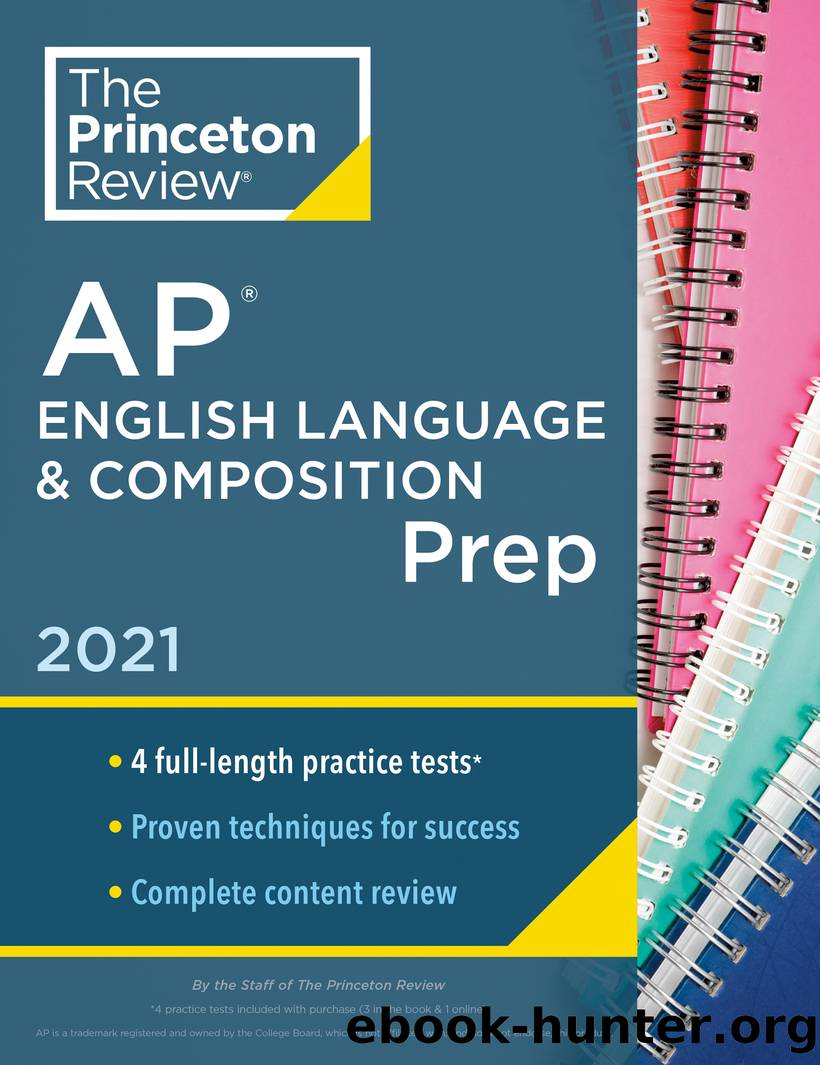Princeton Review AP English Language & Composition Prep, 2021 by The Princeton Review

Author:The Princeton Review [The Princeton Review]
Language: eng
Format: epub
Publisher: Random House Children's Books
Published: 2020-09-22T00:00:00+00:00
The Assessment
In terms of the task given in the prompt, this student gets it to a large extent. Instead of simply rehashing the authorâs message, the writer focuses on the rhetorical strategies the author uses to help readers understand, remember, and accept his rules for gaining wealth. The writer gives evidence from the passage to support the claims in the essay. Itâs obvious that the writer planned ahead before she started writing, since the first paragraph contains a laundry list of rhetorical strategies that are discussed in the following paragraphs.
That sense of checking items off a list makes the discussion adequate, landing this essay at mid-range score. Itâs the âanalyzeâ part of the task where this studentâs essay falls short of a top score. The explanations donât have the depth, sophistication, or conviction to elevate the essay into the higher score range. A more effective, thorough analysis would explain how each of the authorâs rhetorical strategies fits into the interplay among purpose, audience, and context.
For example, plenty of authorities counsel thrift. Why was Benjamin Franklin a particularly good one for Barnum to cite? The student doesnât explore what the author gains with a mass audience by drawing on a trusted framer of the Constitution: Barnum gains credibility for his message, legitimacy for his subject (the pursuit of wealth), and a connection to the concept of helping people build something.
As another example, the student misses the fact that Barnum uses different rhetorical strategies to achieve different purposes. Before he can successfully teach readers how to become wealthy, Barnum needs to convince them that his desire to help them is genuine and that they will benefit from his book. In order to achieve that initial purpose, he first gets his readers on his side with a rousing, encouraging âland of opportunityâ opening. Itâs easy to make money in a country where there is so much land and so many jobs, he claims. An ordinary reader would likely feel, âI can actually do this, too, just like the famous Barnum did, and he really wants me to succeed.â Next, Barnum identifies with his readers and demonstrates that he understands them: âI have no doubt many of my hearers will agree it is the most difficult thing in the world to keep it.â Only then does he turn to his main purpose, launching into the stories that teach the difference between false economy (which does not lead to wealth) and true economy (which does).
In addition to the superficial analysis, another weakness in this essay occurs in the sophistication of expression. No one expects a polished essay from a 40-minute effort. However, there is a choppy, disjointed quality to the way the essay develops, and a weakness in the control of English mechanics (such as some confusion in verb tenses and some unclear pronoun antecedents). As a result, itâs difficult to follow the argument in spots. A more in-depth analysis of Barnumâs rhetorical strategies would have raised the essayâs score another notch. Effective essays demonstrate a smoother, more controlled prose style than this student achieves.
Download
This site does not store any files on its server. We only index and link to content provided by other sites. Please contact the content providers to delete copyright contents if any and email us, we'll remove relevant links or contents immediately.
The Manga Guide to Calculus by Hiroyuki Kojima(502)
AP Computer Science Principles by Seth Reichelson(497)
6 SAT Practice Tests by Philip Geer(493)
500 Key Words for the SAT by Charles Gulotta(442)
The Official ACT Prep Guide 2020--2021 by ACT(440)
McGraw-Hill Education SAT Elite 2022 by Christopher Black(431)
AP Art History by John B. Nici(429)
McGraw-Hill Education SAT Elite 2021 by Christopher Black(405)
McGraw-Hill Education SAT 2021 by Christopher Black(389)
5 Steps to a 5: AP Chinese Language and Culture by JianMin Luo(384)
Princeton Review AP Biology Premium Prep, 2021 by The Princeton Review(377)
Cracking the AP English Literature & Composition Exam, 2018 Edition by Princeton Review(374)
Princeton Review ACT Premium Prep, 2021 by The Princeton Review(363)
Princeton Review AP Biology Prep, 2021 by The Princeton Review(355)
Catholic High School Entrance Exams by Kaplan(349)
Princeton Review AP English Literature & Composition Prep, 2021 by The Princeton Review(348)
Regents Algebra I Power Pack Revised Edition by Gary M. Rubinstein(344)
Fiske Guide to Colleges 2014 by Edward B. Fiske(336)
Tips You Must Know About MS Word (The Complete MBA CourseWork Series) by Ibnalkadi Hicham & Mohamed(329)
